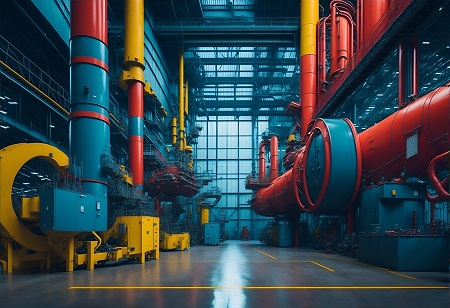
According to JP Morgan Asset Management, tech manufacturers in Asia are well positioned to remain resilient in the coming year as factories are seen stocking up on inventories to end a rather difficult year.
Adrian Tong and Raisah Rasid, global market strategists at the asset manager noted how tech-related manufacturing slowed dramatically in 2023 from its peak in 2022 owing to the global chip supply chain glut in a 28 November note.
The tech inventory destocking trend “appears to be behind us”, although green shoots are beginning to emerge, & with factories reporting inventory adjustments in the latter part of 2023.
“Following the inventory overhang, there are signs of inventory accumulation, pointing to a more constructive near-term outlook by Asian tech manufacturers,” Tong and Rasid said in the note. “Looking ahead, the tech-related sector will continue to support regional growth even as domestic demand could see some pullback into next year.”
The tech industrial output of Asia by some of the biggest manufacturers in this region has surprisingly increased in recent months, particularly in the semiconductor industry, they added.
The manufacturing industry in Asia is evolving rapidly owing to several factors such as geopolitical shifts, changing consumer demands and technological advancements. As we look forward to 2024, a myriad of key trends are set to shape the manufacturing region in the continent. Asia has been at the forefront of both innovation as well as adaptation from digital transformation to sustainable practices. Today let us look at the most significant trends in the manufacturing industry in Asia for the year 2024.
Digital Transformation & Industry 4.0
The Asian countries are embracing digital transformation and smart manufacturing by integrating advanced and smart technologies in order to improve the productivity & efficiency of the manufacturing industry. Intelligent manufacturing driven by technologies that include AI, IoT, and big data analytics is becoming highly prevalent while factories are becoming interconnected enabling real-time data & predictive maintenance. This shift towards smart manufacturing enhances operational efficiency and opens new possibilities for innovation & customization.
Siemens Digital Industries Software is driving transformation with the aim of enabling digital enterprise where the manufacturing, engineering, & and electronics design meet tomorrow. Through Siemen’s Xcelerator portfolio, the company is facilitating various other companies of all sizes to develop as well as leverage digital twins in order to drive innovation.
Additive Manufacturing
Manufacturing companies in Asia are recognizing the potential of additive manufacturing to revolutionize conventional manufacturing practices. Since 3D printing allows for rapid prototyping and reduced material waste, it is possible for manufacturing companies to create complex designs which were previously impossible. In the coming year, we can anticipate rise in adoption of 3D printing across industries in Asia, right from automotive & aerospace to healthcare & consumer goods.
One such company offering next-generation industrial composite 3D printers is Markforged. The company’s main focus & sole purpose is to deliver strong, accurate parts of every print.
“Much of manufacturing today has moved beyond the kind of labour-intensive, low-cost production that informs traditional stereotypes of manufacturing,” explained Dan Steele, senior director of Global Environmental, Health Safety and Security Operations at GlobalFoundries, Singapore in an interview with Manufacturing Asia.
Robotics & Automation
One of the longstanding trends in Asian manufacturing is the implementation of robotics & automation. Cobots are becoming highly prevalent by working alongside human employees in order to improve efficiency, productivity and safety. As the price of robotics decrease, more Asian manufacturing companies are anticipated to integrate advanced robotic systems into their manufacturing processes.
For more than three decades, the top manufacturers around the globe have always relied on Epson Robots for reducing their production costs, enhance product quality & increase their bottom line. Epson Robots is one of the leading suppliers to a wide variety of manufacturing industries.
“In the future, there will be more convenience, and industries will no longer rely on conventional systems, such as manually moving flour. This convenience is not intended to eliminate jobs for operators but to reduce human errors,” says Vincent Mintarja, product director of Kawan Lama Solution.
Sustainable Manufacturing
Sustainability is one of the growing concerns today owing to several environmental threats that can impact the sustainability of the planet and hence manufacturing companies in Asia are embracing eco-friendly practices. Companies are implementing sustainable initiatives right from reducing Carbon emissions to optimize resource usage.
Hyundai – the South Korean automaker has committed to decrease its carbon emissions 75 per cent below the 2019 level by the year 2040. The company aims to have 30 per cent of its global sales coming from ZEVs by 2030. The carmaker is continuing to make investments in technologies & platforms in its drive to electric & focus more on mobility with zero carbon emissions.
Advanced materials & Nanotechnology
The search for enhanced performance & efficiency is bolstering the adoption of advanced materials and nanotechnology is bolstering the adoption of advanced materials & nanotechnology in the manufacturing industry in Asia. In sectors such as automotive & aerospace, lightweight & high-strength materials are gaining traction. With an aim to obtain innovative solutions for several manufacturing challenges, manufacturers are applying nanotechnology to improve the properties of materials.
“Across Asia, we are seeing organizations ramp up their investments, realigning their strategies towards harnessing and integrating AI technology,” said Paul Churchill, vice president and general manager at Vertiv Asia.
As we navigate the manufacturing industry in the Asian continent for 2024, it is apparent that this sector is undergoing a serious transformation. Asian manufacturing companies are at the forefront of innovation from prioritizing sustainability to embracing digital technologies. Also, the convergence of these trends improves the competitiveness of companies and contributes to the overall growth as well as the dynamism of the manufacturing sector in Asia. Edging forward, adaptability, commitment to excellence, as well as collaboration, will be some of the key factors to drive success for manufacturers in the countries in Asia.

